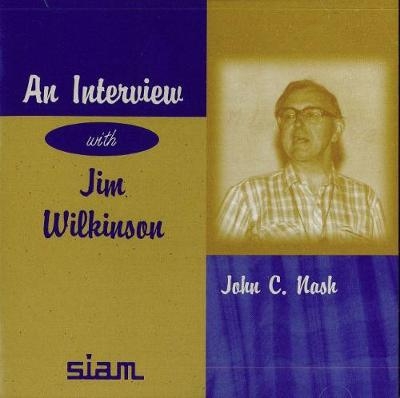
An Interview with Jim Wilkinson
1987
Society for Industrial & Applied Mathematics,U.S. (Verlag)
978-0-89871-512-5 (ISBN)
Society for Industrial & Applied Mathematics,U.S. (Verlag)
978-0-89871-512-5 (ISBN)
Recorded in July 1984, just two years before Wilkinson's death, this interview preserves some of the spirit, as well as the facts, of mathematical history. Wilkinson discusses his work, including the building of Turing's Pilot Automatic Computing Engine (ACE), his involvement in the field of computation, and his personal view of early computational developments in numerical analysis.
This interview with James Hardy Wilkinson will take listeners back to a period, now 50 years ago, when computers were quirky, cantankerous, hand-built contraptions; duplicate copies of documents were made with carbon paper; trains were pulled by steam locomotives; and (black and white) television was just being introduced.
Recorded in July 1984, just two years before Wilkinson's death, this interview preserves some of the spirit, as well as the facts, of mathematical history. Wilkinson discusses his work, including the building of Turing’s Pilot Automatic Computing Engine (ACE), his involvement in the field of computation, and his personal view of early computational developments in numerical analysis. Educated at Cambridge in mathematics, Wilkinson was drawn into computation as a result of work on ballistics calculations during World War II. He joined the Mathematics Division at the National Physical Laboratory in England shortly after the war and stayed there for the rest of his career, although he was a frequent visitor to other institutions, particularly Argonne National Laboratory and Stanford University.
Although an extensively edited version of the technical content of the interview appeared in the February 1985 issue of Byte magazine, the written form could not convey the slips and nuances in Wilkinson's voice as well as some of the anecdotes and intonations that brought spirit to his words. Now, thanks to modern audio technology, the original tapes, which had begun to deteriorate, have been reproduced and preserved in their entirety on compact disk.
This interview with James Hardy Wilkinson will take listeners back to a period, now 50 years ago, when computers were quirky, cantankerous, hand-built contraptions; duplicate copies of documents were made with carbon paper; trains were pulled by steam locomotives; and (black and white) television was just being introduced.
Recorded in July 1984, just two years before Wilkinson's death, this interview preserves some of the spirit, as well as the facts, of mathematical history. Wilkinson discusses his work, including the building of Turing’s Pilot Automatic Computing Engine (ACE), his involvement in the field of computation, and his personal view of early computational developments in numerical analysis. Educated at Cambridge in mathematics, Wilkinson was drawn into computation as a result of work on ballistics calculations during World War II. He joined the Mathematics Division at the National Physical Laboratory in England shortly after the war and stayed there for the rest of his career, although he was a frequent visitor to other institutions, particularly Argonne National Laboratory and Stanford University.
Although an extensively edited version of the technical content of the interview appeared in the February 1985 issue of Byte magazine, the written form could not convey the slips and nuances in Wilkinson's voice as well as some of the anecdotes and intonations that brought spirit to his words. Now, thanks to modern audio technology, the original tapes, which had begun to deteriorate, have been reproduced and preserved in their entirety on compact disk.
| Zusatzinfo | Worked examples or Exercises |
|---|---|
| Verlagsort | New York |
| Sprache | englisch |
| Themenwelt | Literatur ► Biografien / Erfahrungsberichte |
| Mathematik / Informatik ► Informatik ► Theorie / Studium | |
| Mathematik / Informatik ► Mathematik ► Geschichte der Mathematik | |
| ISBN-10 | 0-89871-512-1 / 0898715121 |
| ISBN-13 | 978-0-89871-512-5 / 9780898715125 |
| Zustand | Neuware |
| Haben Sie eine Frage zum Produkt? |